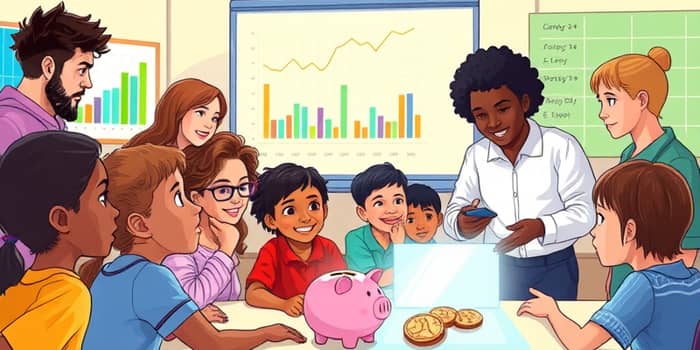Financial literacy is a cornerstone of personal empowerment, yet many learners graduate without a firm grasp of money management. Educational finance tools bridge this gap by offering engaging, hands-on experiences that build confidence and competence.
Why Financial Literacy Matters
Lack of financial education can lead to overwhelming debt, poor credit scores, and missed opportunities. When individuals develop solid financial decision-making skills, they can navigate complex choices, plan for the future, and avoid costly mistakes.
From everyday budgeting to long-term retirement planning, a strong financial foundation supports stability and growth. Introducing these concepts early ensures learners build enduring habits.
Core Topics in Financial Education
- Budgeting: Tracking income versus expenses, needs versus wants.
- Banking: Understanding savings and checking accounts, online banking tools.
- Credit & Debt: Credit scores, loans, responsible borrowing and repayment.
- Saving & Investing: Compound interest, goal-based saving, basic investment strategies.
- Insurance & Risk: Types of coverage, risk management principles.
- Tax Basics & Employment: Wages, payroll deductions, filing returns.
- Financial Decision-Making: Opportunity costs, major purchase planning.
Covering these topics equips learners with comprehensive money management strategies that apply to real life.
Types of Educational Finance Tools
Innovative platforms cater to different age groups and learning styles, transforming abstract concepts into real-world money management experiences.
- Interactive Simulations & Games: Scenario-based learning fosters practical skills.
- Curricula & Lesson Plans: Standards-aligned modules for classroom integration.
- Budgeting & Planning Apps: Digital tools for goal tracking and expense monitoring.
Leading Platforms and Resources
A wealth of free and premium options allows educators and learners to choose the best fit for their needs. Below is an overview of notable tools.
Alignment with Educational Standards
Most curricula align with Common Core State Standards and state-specific benchmarks. This ensures that financial lessons integrate seamlessly with math, economics, and social studies objectives.
Assessment tools, certificates of completion, and teacher guides support measurable outcomes. Educators can track progress and adapt lessons to meet classroom goals.
Implementation and Accessibility
Many resources are free to educators and require minimal setup, making them accessible to schools with limited budgets. Digital platforms often include support materials, tutorials, and community forums.
- User-friendly interfaces encourage independent exploration.
- Differentiated content adapts to various learning levels.
- Mobile compatibility extends learning beyond the classroom.
By providing flexible, scalable learning experiences, these tools empower teachers and engage students effectively.
Outcomes and Impact
Effective use of educational finance tools leads to improved savings habits, better budgeting behaviors, and informed borrowing decisions. Studies show participants feel more confident handling money and setting financial goals.
Long-term impacts include reduced debt, higher credit scores, and greater readiness for significant life events such as college enrollment or homeownership. Financially literate individuals are more likely to build wealth and navigate economic challenges.
Conclusion
Educational finance tools are transforming the way learners of all ages approach money. By combining engaging experiences with rigorous standards, these resources cultivate lifelong financial wellness habits.
Whether through interactive games, comprehensive curricula, or intuitive apps, implementing the right mix of tools can empower the next generation to achieve financial stability and pursue their dreams with confidence.
References
- https://www.nea.org/professional-excellence/student-engagement/tools-tips/tools-teaching-financial-literacy
- https://www.intuit.com/blog/innovative-thinking/teaching-financial-literacy/
- https://www.bhfcu.com/explore/learn/blog/6-free-financial-education-tools-at-your-fingertips
- https://www.occ.gov/topics/consumers-and-communities/community-affairs/resource-directories/financial-literacy/index-financial-literacy-resource-directory.html
- https://ospi.k12.wa.us/student-success/resources-subject-area/financial-education/financial-education-resources
- https://www.investopedia.com/terms/f/financial-literacy.asp
- https://www.entrepreneur.com/money-finance/top-5-tools-to-build-your-financial-literacy/453801
- https://www.cde.ca.gov/re/cc/










